

Copyright Advisory Office. Cb_copyright. Copyright Alliance Foundation. Ethical Issues. ALA's Position Statement on the Confidentiality of Library Records The ethical responsibilities of librarians, as well as statues in most states and the District of Columbia, protect the privacy of library users.
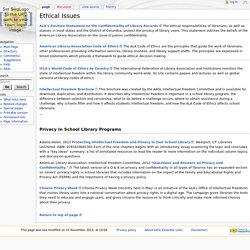
This statement outlines the beliefs of the American Library Association on the issue of patron confidentiality. American Library Association Code of Ethics The ALA Code of Ethics are the principles that guide the work of librarians, other professionals providing information services, library trustees, and library support staffs. The principles are expressed in broad statements which provide a framework to guide ethical decision making. IFLA's World Code of Ethics by Country The International Federation of Library Association and Institutions monitors the state of intellectual freedom within the library community world-wide. Its site contains papers and lectures as well as global versions of library codes of ethics. Privacy in School Library Programs American Library Association. Cb_copyright. Copyright Advisory Office. Remix, Reuse, Recombine: Holding a Seminar on Mash-Up Culture. Overview | How are the dynamics of the Web affecting how we read, think and create?
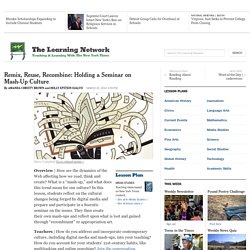
What is a “mash-up,” and what does this trend mean for our culture? In this lesson, students reflect on the cultural changes being forged by digital media and prepare and participate in a Socratic seminar on the issues. They then create their own mash-ups and reflect upon what is lost and gained through “recombinant” or appropriation art. Teachers | How do you address and incorporate contemporary culture, including digital media and mash-ups, into your teaching? How do you account for your students’ 21st-century habits, like multitasking and online searching? Materials | Computer with Internet access and projection equipment, copies of the image (see Warm-Up) and handouts.
Warm-Up | Display a copy of or project the image Monster Mash-Up and lead students through it. Ask: Are these thoughtful reinventions with new purposes and messages? Read the article with your class, using the questions below. Music6. Please No Posers. Plagiarism.org. Research Misconduct: Fraud and Plagiarism - Video & Lesson Transcript. Avoiding Plagiarism: How to Quote and Paraphrase in Your Writing - Video & Lesson Transcript. Plagiarism Quiz.
9-10: Master You're a plagiarism expert!
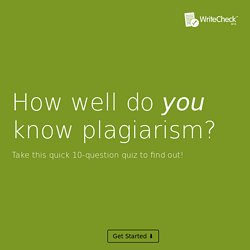
Continue writing originally and bolstering ideas with properly cited sources. Tweet how awesome you are and share it with your classmates, friends, or instructors! 7-9: Pro You're a citation pro! Plagiarism Tutorial: Test Your Knowledge. Plagiarism is a serious academic offense!

The University of Southern Mississippi's undergraduate and graduate bulletins both include statements about plagiarism: "When cheating is discovered, the faculty member may give the student an F on the work involved or in the course. If further disciplinary action is deemed appropriate, the undergraduate student should be reported to the Dean of Students. A graduate student should be reported to the Dean of the Graduate School. " "In addition to being a violation of academic honesty, cheating violates the code of student conduct and may be grounds for probation, suspension, expulsion, or all three.
" When a student avoids plagiarizing someone else's work, she or he doesn't just avoid doing something wrong. Topics of the Times. Note: This lesson was originally published on an older version of The Learning Network; the link to the related Times article will take you to a page on the old site.
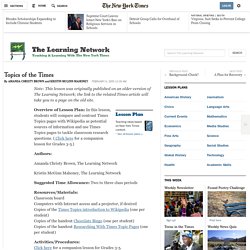
Overview of Lesson Plan: In this lesson, students will compare and contrast Times Topics pages with Wikipedia as potential sources of information and use Times Topics pages to tackle classroom research questions. ( Click here for a companion lesson for Grades 3-5.) Authors: Amanda Christy Brown, The Learning Network Kristin McGinn Mahoney, The Learning Network Suggested Time Allowance: Two to three class periods Resources/Materials: Classroom board Computers with Internet access and a projector, if desired Copies of the Times Topics introduction to Wikipedia (one per student) Copies of the handout Chocolate Bingo (one per student) Copies of the handout Researching With Times Topic Pages (one per student) Activities/Procedures: Click here for a companion lesson for Grades 3-5. 1. A. A Way With Words. Note: This lesson was originally published on an older version of The Learning Network; the link to the related Times article will take you to a page on the old site.
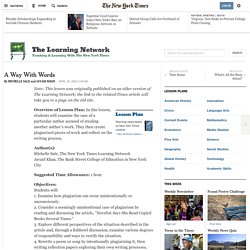
Overview of Lesson Plan: In this lesson, students will examine the case of a particular author accused of stealing another author’s work. They then create plagiarized pieces of work and reflect on the writing process. Author(s): Michelle Sale, The New York Times Learning Network Javaid Khan, The Bank Street College of Education in New York City Suggested Time Allowance: 1 hour Objectives:Students will: 1. Resources / Materials:-student journals -pens/pencils -paper -classroom board -copies of “Novelist Says She Read Copied Books Several Times” (found online at (one per student) -resources about the roles of various people involved in the publishing process, such as writer, editor, agent, publisher, etc. Activities / Procedures:1. Further Questions for Discussion:-Why would someone write a book? Extension Activities:1. Plagiarism.org - Best Practices for Ensuring Originality in Written Work.